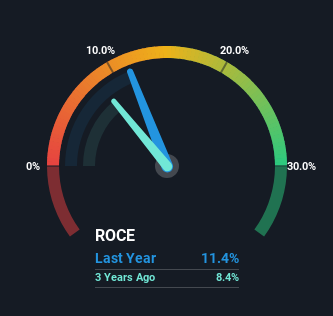- Hong Kong
- /
- Consumer Services
- /
- SEHK:382
There Are Reasons To Feel Uneasy About Edvantage Group Holdings' (HKG:382) Returns On Capital
What are the early trends we should look for to identify a stock that could multiply in value over the long term? Amongst other things, we'll want to see two things; firstly, a growing return on capital employed (ROCE) and secondly, an expansion in the company's amount of capital employed. If you see this, it typically means it's a company with a great business model and plenty of profitable reinvestment opportunities. However, after investigating Edvantage Group Holdings (HKG:382), we don't think it's current trends fit the mold of a multi-bagger.
What Is Return On Capital Employed (ROCE)?
If you haven't worked with ROCE before, it measures the 'return' (pre-tax profit) a company generates from capital employed in its business. The formula for this calculation on Edvantage Group Holdings is:
Return on Capital Employed = Earnings Before Interest and Tax (EBIT) ÷ (Total Assets - Current Liabilities)
0.11 = CN¥687m ÷ (CN¥8.2b - CN¥2.1b) (Based on the trailing twelve months to February 2024).
Thus, Edvantage Group Holdings has an ROCE of 11%. That's a relatively normal return on capital, and it's around the 12% generated by the Consumer Services industry.
See our latest analysis for Edvantage Group Holdings

In the above chart we have measured Edvantage Group Holdings' prior ROCE against its prior performance, but the future is arguably more important. If you're interested, you can view the analysts predictions in our free analyst report for Edvantage Group Holdings .
So How Is Edvantage Group Holdings' ROCE Trending?
On the surface, the trend of ROCE at Edvantage Group Holdings doesn't inspire confidence. Around five years ago the returns on capital were 17%, but since then they've fallen to 11%. Although, given both revenue and the amount of assets employed in the business have increased, it could suggest the company is investing in growth, and the extra capital has led to a short-term reduction in ROCE. If these investments prove successful, this can bode very well for long term stock performance.
What We Can Learn From Edvantage Group Holdings' ROCE
Even though returns on capital have fallen in the short term, we find it promising that revenue and capital employed have both increased for Edvantage Group Holdings. However, despite the promising trends, the stock has fallen 24% over the last five years, so there might be an opportunity here for astute investors. So we think it'd be worthwhile to look further into this stock given the trends look encouraging.
On a final note, we've found 1 warning sign for Edvantage Group Holdings that we think you should be aware of.
If you want to search for solid companies with great earnings, check out this free list of companies with good balance sheets and impressive returns on equity.
Valuation is complex, but we're here to simplify it.
Discover if Edvantage Group Holdings might be undervalued or overvalued with our detailed analysis, featuring fair value estimates, potential risks, dividends, insider trades, and its financial condition.
Access Free AnalysisHave feedback on this article? Concerned about the content? Get in touch with us directly. Alternatively, email editorial-team (at) simplywallst.com.
This article by Simply Wall St is general in nature. We provide commentary based on historical data and analyst forecasts only using an unbiased methodology and our articles are not intended to be financial advice. It does not constitute a recommendation to buy or sell any stock, and does not take account of your objectives, or your financial situation. We aim to bring you long-term focused analysis driven by fundamental data. Note that our analysis may not factor in the latest price-sensitive company announcements or qualitative material. Simply Wall St has no position in any stocks mentioned.
About SEHK:382
Edvantage Group Holdings
An investment holding company, operates private higher and vocational education institutions in the People’s Republic of China, Australia, and Singapore.
Undervalued with adequate balance sheet and pays a dividend.
Market Insights
Community Narratives



